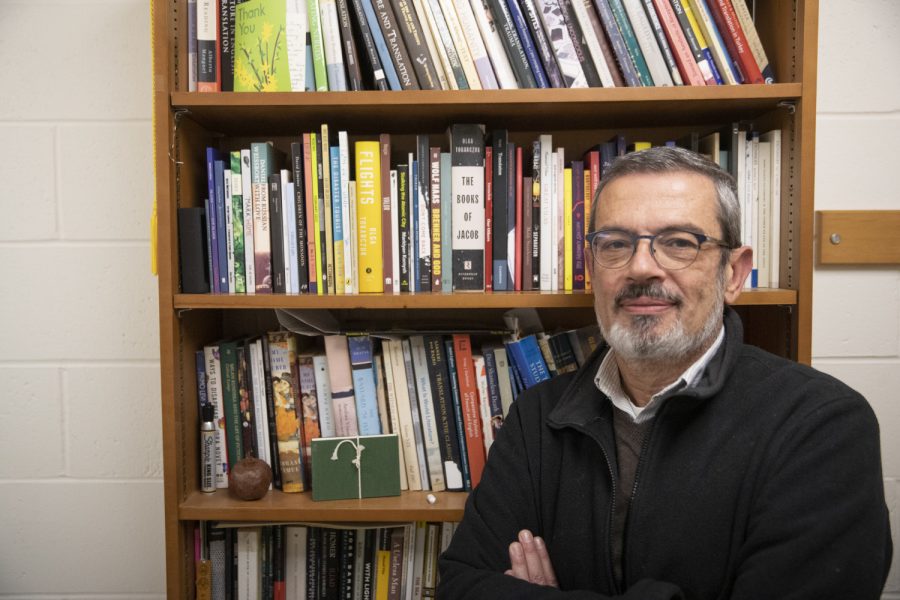Ask the Author | Aron Aji
Aron Aji is the Director of Translation Programs at the University of Iowa. Having to move between multiple languages from a young age, Aji discovered a passion for literary translation early in life. He has published four books and received multiple prestigious honors.
Dr. Aron Aji poses for a portrait in his office in Phillips Hall, Iowa City Iowa on Nov. 14th. Dr. Aji has two upcoming translated works.
November 30, 2022
Aron Aji, Director of Translation Programs, joined the UI faculty in 2014. A native of Turkey, he has translated works by Bilge Karasu, Murathan Mungan, Elif Shafak, Latife Tekin, and other Turkish writers. His book length translations include: “Karasu’s Death in Troy,” “The Garden of Departed Cats,” “A Long Day’s Evening,” and “Mungan’s Valor: Stories,” co-translated with David Gramling. He has won several translation-related awards, including the 2004 National Translation Award. His forthcoming translations include Ferid Edgü’s “Wounded Age and Eastern Tales,” Ebru Ojen’s “Lojman,” and Efe Duyan’s volume of poetry, “The Behavior of Words.” Aji was president of The American Literary Translators Association between 2016-2019.
The Daily Iowan: Could you explain a bit about your literary background?
Aji: I’m originally from Turkey, and have been in the US for the past 40 years. I was born into a Sephardic family in which my grandmother insisted that we communicate in Ladino, the Spanish dialect spoken by Sephardic Jews. French and Hebrew were just as common in our small community. I think translation has always been present in my life since everyone was either translating or being translated. My elementary school education was in Turkish, but beginning at age 12, I attended English instruction schools, including college. In other words, I don’t recall any period in my life when my mind wasn’t moving between languages. When I came to the US for graduate study, I had brought a handful of Turkish poetry volumes that I thought I might like to translate sometime. But it wasn’t until a decade later, in the 1990s, that I started translating literary works from Turkish to English.
RELATED: Ask the Author | Carmen Maria Machado
DI: What prompted you to write your latest book? Why is it meaningful to you?
Aji: If you mean “Valor: Stories,” the most recently published, that is my fourth book-length translation. It’s also my first collaborative translation, with my colleague David Gramling, whose understanding of queer aesthetics was crucial in recreating Mungan’s language in English. As the promotional blurb describes it: “Among Mungan’s signature works, ‘Valor: Stories Cenk Hikayeleri’ has long been considered a milestone of twentieth century Turkish literature.” Given the small but steadily increasing number of major Turkish works available in English translation, every new translation adds to the critical effort to map out the rich dimensions of Turkish literature so that each work can also be read in its own cultural context. At the same time, Mungan is truly a master of short-fiction, and some of the stories in this book easily belong among the best short-fiction written in any language.
DI: Why do you think translation is an important area of study in the University of Iowa?
Aji: In 2023, we celebrate the 60th anniversary of the first translation workshop offered at the UI, which was also the first ever in a US university. Our MFA program in Literary Translation also turns 50 in 2024. And this year, we launched a new BA in Translation. In other words, we have a very long history and an energetic environment in which to study and practice translation. And it is no coincidence that all this is happening at the UI, with its renowned International Writing Program and the countless writing arts programs.
DI: For somebody interested in translation, what would you recommend as the best way to go about studying it? What other messages do you have for UI students?
Aji: Declare the new BA in Translation. By design, it complements all areas of study that investigate international and global topics and that prepare students for global careers. You will gain not only a practical asset, but also the “language” of co-existence, and an exciting way to engage, create, and collaborate in the global society.














